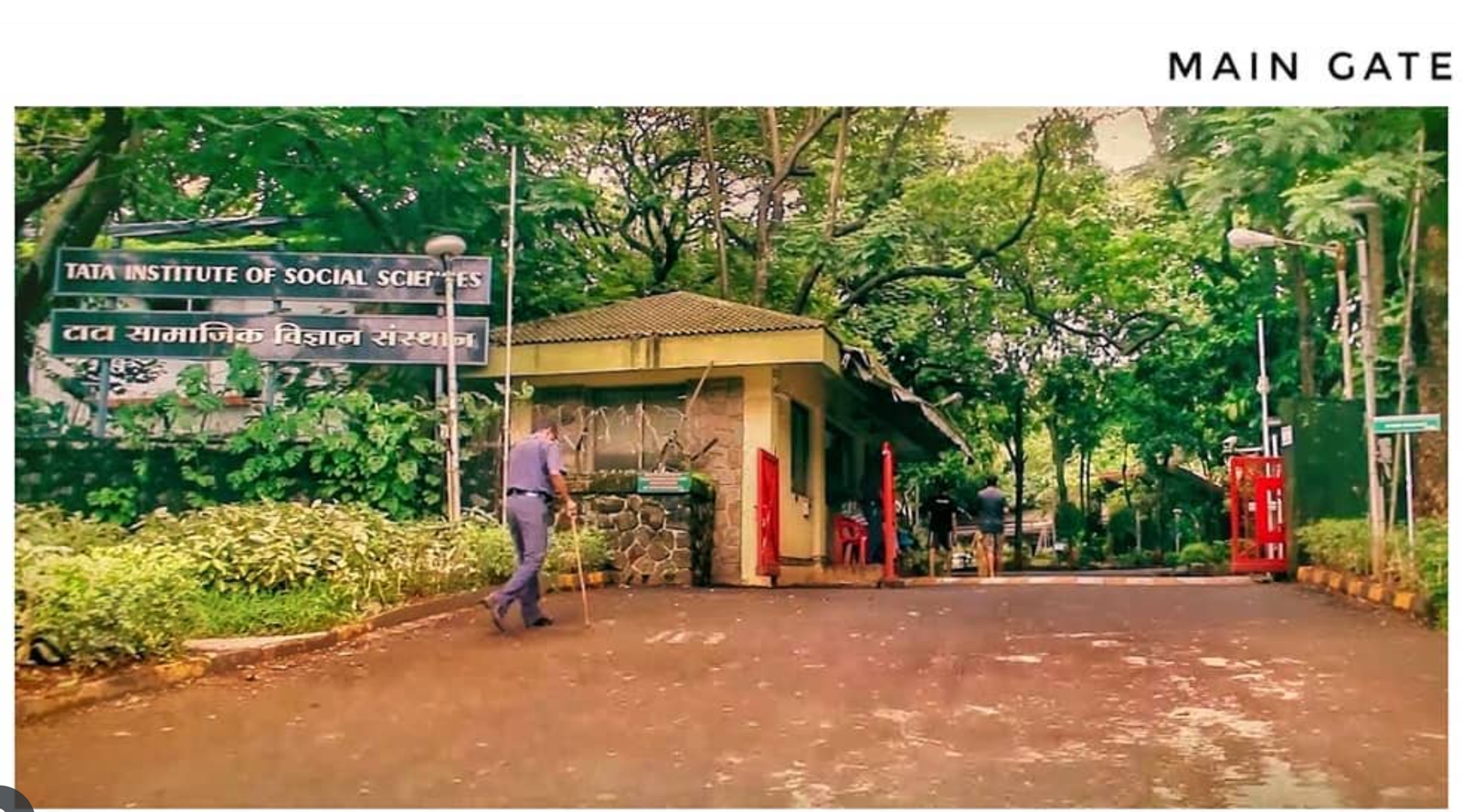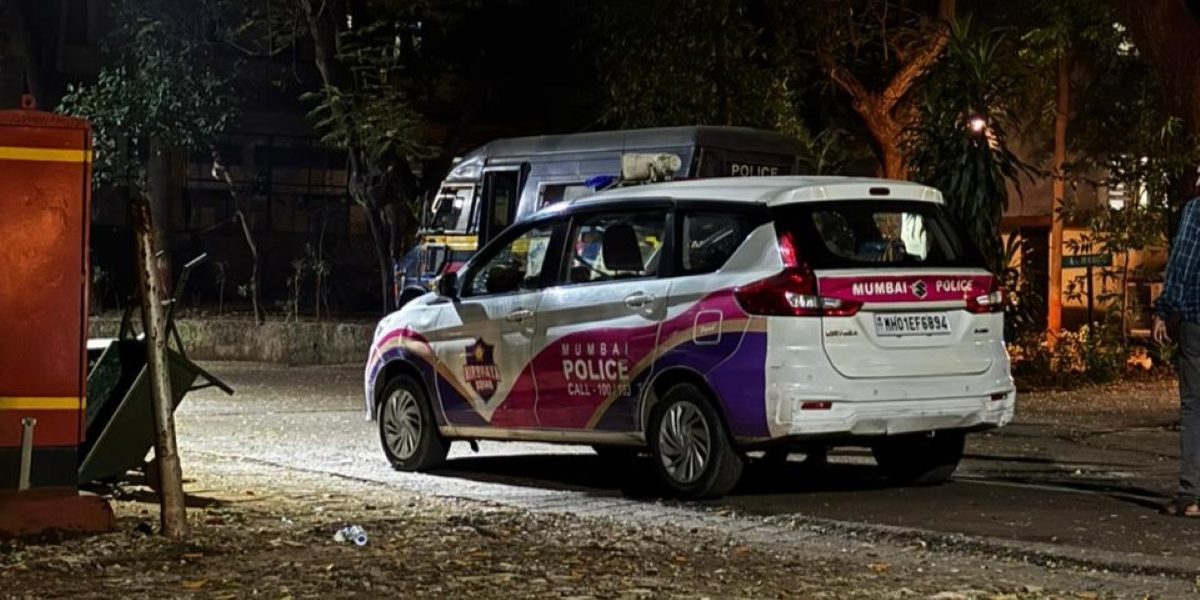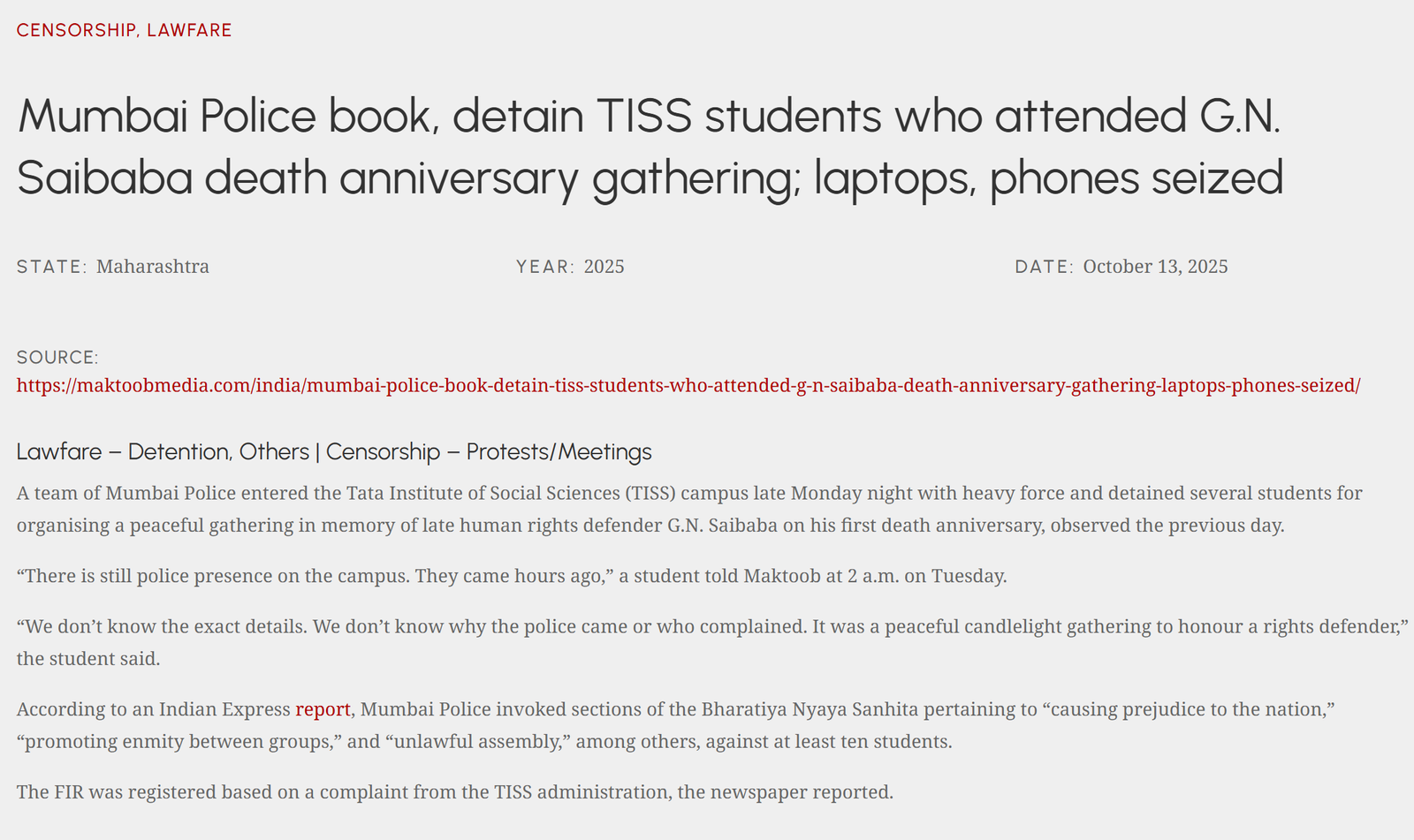The price of political engagement and learning today*
Recording the sequence of events and observations on the current events unfolding in TISS, Mumbai, from students’ perspective
What is the price of political engagement and learning in a higher educational institute in India? It seems that young people who seek to read, talk to each other and understand any issue slapped with FIRs before they can fully make up their minds on what stance to take.
On Sunday, 12 October 2025, students at the Tata Institute of Social Sciences, Mumbai gathered to read a few poems written by Professor GN Saibaba to mark his death anniversary. They gathered in a peaceful manner, read the poems, placed a few candles around a photograph of Professor Saibaba and dispersed—all in about ten minutes. For many of the students, this year has been the first time they have learnt of the scholar and activist’s life, work, and death. The gathering came as a spontaneous response to discovering his poems.

Credit: Instagram/being_tissian/
The event then drew attention online when a group of students opposed to the idea—allegedly part of a group called Democratic Secular Students Forum—tweeted photographs that they took of the gathered students without consent and tagged the Maharashtra CM and police. This brought the police into campus premises around 10pm on Sunday night itself, questioning both students and admin officials at the late hour.
The TISS administration has been reported to have quickly registered a complaint against the gathering, without the slightest attempt to first resolve the matter internally. The students, many of whom are young Dalit and queer, have been reportedly booked under sections of the Bharatiya Nyaya Sanhita related to “causing prejudice to the nation”, “causing enmity between various groups”, and unlawful assembly, among other charges.
On the night of 13 October, Trombay police questioned a student for hours and detained him on campus premises, not allowing him to return to his hostel room till the early hours of Tuesday. Students allege that his laptop and phone have been confiscated and done without any warrant or explanation. Others who were with the student at the time of being detained were also intimidated and stopped from having any conversation with the detained student, even if they had nothing to do with Sunday’s gathering. Others gathered too have been called by authorities to provide their home addresses and appear for questioning by the police, all of it amounting to great mental and physical distress for the students.
Emerging reports on the incident cite the police and others claiming that the gathered students raised slogans unrelated to G.N. Saibaba. There is no proof brought forth on the same. The students deny engaging in any kind of sloganeering and are steadfast that these are false claims. Reports are also varied, unverified, and misleading, claiming that several students have been detained. The lack of clear communication from the institute is causing panic and divides among the students.
Professor Saibaba was a writer and human rights activist. He was imprisoned for a decade for allegedly having links with the banned Communist Party of India (Maoist) but was acquitted first in October 2022 by the Bombay High Court. The order that overturned the life imprisonment sentence of 2017, pointed to procedural lapses in securing appropriate sanctions and in the seizure of the alleged electronic evidence from the accused person(s). After a Supreme Court stay that was brought on the order, and presented before the court once again, he was re-acquitted of all charges in March 2024 by the Nagpur Bench of the Bombay High Court.
However, Professor Saibaba, with 90% disability and wheelchair bound had suffered various illnesses in the prison, and his fragile health gave way only a few months after his release. Many scholars, writers, social workers, human rights advocates, and students across the country mourned his death. University spaces around the world held talks and discussions in his honour.
Academic debate and learning
At the Tata Institute of Social Sciences, scholars have often held gatherings to commemorate events of cultural and political importance, birth and death anniversaries of thinkers and writers. Student groups have called for attention to students and youth concerns, providing a space for younger students to hear and evaluate information. In the last year or so, these gatherings and discussions have reduced to nearly zero, with no information about the protocol to be followed to hold any event on campus premises.
In January 2024, students received a circular by email that restricted all student activities until further notice. Over the course of the year, several events have been held by schools and student groups alike, some being reprimanded by the administration and others being encouraged. However, official protocols to seek permission for student led events are still unclear and elusive to most students. In fact, a former official had once allegedly sought to unofficially stop a gathering from reading the works of Annabhau Sathe on his birth anniversary, questioning the poet’s credentials and relevance. Such incidents have left us, the student community, feeling afraid of any kind of engagement with the realities of the world both past and present.
Educational institutions are spaces that ought to nurture healthy debate, allow for students to search and re search on all matters that surround them, the mirco and macro processes that make up their everyday lives. TISS too has a long legacy of standing up for what is right and speaking truth to power. In 2011, students boycotted their own convocation, protesting the then proposed Jaitapur nuclear power point, as the chief guest was the then Union Environment Minister Jairam Ramesh. The protesting students were not penalized for their efforts, rather had a conversation with. Such engagements are the reason that TISS alumni have been able to contribute to the professional world, enrich advocacy and governance efforts, work alongside the state and even enter formal politics.
For the last few years, this spirit of debate and discussions has waned due to bureaucratic and external pressures that have threatened the security that students are promised in spaces of learning.
TISS has always, until 2024, had a democratically elected student union to represent and address the needs of the larger student body. However, for the last two academic years, the process of elections has all but been forgotten by the administration. The students navigate academic demands and challenges that living in a large city can bring – from hostel, library and dining hall irregularities to personal struggles – through informal, non-elected class representatives or hastily put together Whatsapp groups for crisis management. Events and talks held by student groups have been routinely penalized in the last few months, the latest occurrence of which has been the gathering in honour of GN Saibaba.
This drastic step by the TISS administration against its own students needs to give pause for anyone who is interested in the growth and development of young minds in the country. The administration ought to reconsider its role in the lives of students, and begin a meaningful conversation with the student community, rather than close its doors on them, especially those from already marginalized communities by putting their careers at stake. The students, many of whom have little to no support from family and are in fact the only support for their families.
The poems they read on Sunday evening have inspired many a student to question their own biases and prejudices and seek justice where it is routinely denied. This act should not be punished but understood as their seeking to understand the world. When punishment is what reading is met with, we must ask what Professor GN Saibaba asked:
Why Do You Fear My Way So Much?
O Pundit,
O Mulla,
I’m not an atheist
for I don’t preach ungodliness
as my profession.
I’m not an agnostic
for I don’t carry a basketful
of doubts on my head.
I’m not your secularist
for I don’t stand
at the crossroads of all religions.
I’m not a rationalist
for I don’t use
the logic of pure reason.
I’m not a heretic
for my business isn’t
to chase after your orthodox ways
to worship and life.
Kabir says,
He’s a messenger of love for people
Why do you fear my way so much?
(*The identity of the author of this report is withheld to protect them.)
Courtesy: Free Speech Collective


